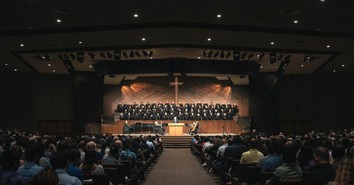3 Servant Leadership Examples in the Bible

When Jesus and His disciples came to the town of Capernaum, He asked them about a dispute they had on the way. They were arguing about who would be the greatest, and Jesus took the opportunity to speak about true leadership — the concept of servant leadership.
And He sat down, called the twelve, and said to them, "If anyone desires to be first, he shall be last of all and servant of all."
Mark 9:35 NKJV
But what is servant leadership, exactly? The concept isn’t fully defined in Jesus’ words or any other simple phrase. Rather, it’s illustrated and illuminated in His life and ministry, and that’s where you should start if you want to become a more effective leader.
Of course, there are other servant leadership examples in the Bible that can help you along the way. By studying other godly men and women who demonstrated the core qualities of a servant leader, you can better appreciate their triumphs and struggles, as well as your own.
3 Servant Leadership Examples in the Bible
Here are three people who stand out as servant leadership examples in the Bible.
1. Moses
“Hear now My words: If there is a prophet among you, I, the Lord, make Myself known to him in a vision; I speak to him in a dream. Not so with My servant Moses; he is faithful in all My house. I speak with him face to face, even plainly, and not in dark sayings; and he sees the form of the Lord. Why then were you not afraid to speak against My servant Moses?”
Numbers 12:6-8
Moses withstood incredible opposition in his time as a leader. In this passage, his family came against him, and Aaron and Miriam questioned if God had spoken through him. That question was put to rest convincingly when God called Moses something few other people in all of Scripture are called — His servant. No one in the Old Testament received the esteemed title more than Moses.
It’s important to keep in mind that Moses only spoke in Numbers 12 to beg God to have mercy on the very people who questioned his status and integrity. And a similar thing happened in Exodus 32, when the people he led abandoned their faith in God to make a golden calf that they worshiped and sacrificed.
The background is arguably even more irreverent toward Moses than the event with Aaron and Miriam. The Israelites formed their plan because “the people saw that Moses delayed coming down from the mountain” and told Aaron: “Come, make us gods that shall go before us; for as for this Moses, the man who brought us up out of the land of Egypt, we do not know what has become of him” (Exodus 32:1).
There are a few remarkable things happening in that passage. First, Moses was delayed because he went to the mountain — for 40 days and 40 nights, with no food or water (Deuteronomy 9:9) — to receive God’s plan for Israel. Next, the term “this Moses” is a Hebrew phrase of disrespect (see 1 Samuel 10:27, 21:15, 25:21, 2 Samuel 13:17) for the one they credited for their exodus out of slavery in Egypt. And finally, of course, the idea is misplaced, as God, not Moses and not a golden calf, helped Israel escape slavery.
God was rightfully angered with the Israelites and told Moses to leave Him alone, so He can destroy them and make a new nation with Moses. But Moses interceded to plead for his people. And later, when dealing with the consequences of the golden calf incident, Moses interceded again. This time, he asked God to “blot me out of Your book which You have written” (Exodus 32:32) if He won’t forgive their sin. Moses risked his life in this world and the next for the possibility of the Israelites’ salvation.
Moses stood up for others and put his life on the line for them. In another example of powerful leadership, he received and accepted godly wisdom from Jethro, his father-in-law (see Exodus 18). It's clear that Moses exhibited many qualities of a servant leader, making him one of the most obvious candidates for servant leadership examples in the Bible.
2. Esther
Go, gather all the Jews who are present in Shushan, and fast for me; neither eat nor drink for three days, night or day. My maids and I will fast likewise. And so I will go to the king, which is against the law; and if I perish, I perish!
Esther 4:16
After receiving godly wisdom from Mordecai, who adopted the young Jewish girl as his own, the girl who became queen of Persia overcame her fears to fight against the plan to rid the empire of Jewish exiles. Esther was willing to die for her people.
What Esther did may not be one of the more popular servant leadership examples in the Bible, but it exhibits two critical qualities of a servant leader that Moses fulfilled. She was receptive to wisdom and put her life on the line for the people she led.
Something else happens in the passage that warrants mentioning: Esther began asserting herself by telling Mordecai that she wanted the people to fast for three days. That’s important in two ways.
1 Esther goes from being afraid to act to taking the initiative. After directing the people to fast, Esther rejected Mordechai’s plan and devised two banquets to save her people.
2 The mention of fasting is almost certainly accompanied by prayer, given the nature of fasting in the Bible. In other words, it became remarkably clear that Esther was a woman of God. That's especially interesting because the Book of Esther is one of two books of the Bible (along with the Song of Solomon) that don’t reference God directly. The resulting theme allows readers to see God’s presence throughout the text, and what’s happening here with Esther is no exception.
Esther was a woman of God who was willing to make the ultimate sacrifice for her people. Her growth in a few short chapters and the rest of the book reveal many important qualities of a servant leader.
3. Peter
The elders who are among you I exhort, I who am a fellow elder and a witness of the sufferings of Christ, and also a partaker of the glory that will be revealed: Shepherd the flock of God which is among you, serving as overseers, not by compulsion but willingly, not for dishonest gain but eagerly; nor as being lords over those entrusted to you, but being examples to the flock; and when the Chief Shepherd appears, you will receive the crown of glory that does not fade away.
1 Peter 5:1-4
Peter’s transformation from an impulsive and inconsistent leader of the disciples — see his reactions to Jesus’ teachings and suffering (John 13:6, 18:20-27) — to a more charismatic leader in John 21 is worthy of in-depth study. So too is the follow-up in Acts 2-4 and the rest of the book.
The featured passage from 1 Peter reflected the disciple’s growth into a full-fledged servant leader. He identified himself as a “fellow elder” to the leaders of the church, demonstrating the community they all shared as spiritually mature leaders. And, just like Christ expressed Himself as the True Shepherd in John 10, they were all shepherds of the flock God has entrusted to them.
The responsibilities that Peter listed in a few verses function as critical qualities of a servant leader. They were charged with being an overseer, a shepherd, a servant, and a steward of God’s flock. Those outward responsibilities join with an inward motivation of willingness and eagerness, and certainly not for money or power.
Look at Peter’s life and ministry to see how those aspects transformed his ability to serve God as an effective leader. The same could be said for Moses, Esther, and several other servant leadership examples in the Bible. Dig into the Word of God to learn how you can be a more effective leader. An online Master of Transformative Ministry can equip you with a biblical foundation to transform individuals, communities, and organizations for God’s glory. You’ll also be transformed as a servant leader of His flock.
Enhance your impact across environments like church ministry, parachurch ministry, and nonprofit organizations. You’ll learn in a flexible environment at Point University, which pursues a mission to educate students for Christ-centered service and leadership throughout the world.
Image courtesy: ©Getty Images / FatCamera
Founded in 1937, Point University is a private liberal arts institution that educates students to influence culture for Christ in all spheres of life. In addition to our online programs, which provide a broad, comprehensive curriculum designed to prepare students for their chosen professions, we operate multiple ground campuses throughout Georgia.
Point University offers accredited associate, bachelor’s, and master’s degrees taught by dedicated faculty who equip the next generation to take their faith into the marketplace in new and culturally relevant ways – to erase the lines between who they are and what they do so that they see life and mission as one and the same.
Originally published April 14, 2021.







